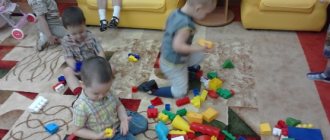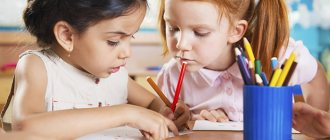The concept and essence of education
Definition 1
Education is a specially organized process aimed at transferring accumulated life experience to the younger generation, forming the correct model of behavior and realizing basic educational goals within the framework of the pedagogical process.
The main goal of education is the cultural, full and comprehensive development of a child capable of physical and spiritual self-development.
Pedagogically properly organized education should encourage the child to personal and cultural growth, self-development, and the desire to develop his spiritual and moral needs and feelings.
The result of upbringing is a full-fledged and harmoniously developed personality, capable of productively existing within the framework of modern society.
Are you an expert in this subject area? We invite you to become the author of the Directory Working Conditions
Education is usually considered from two points of view:
- Education as a social phenomenon is aimed at transmitting historical and cultural experience to the younger generation.
- Education from a pedagogical point of view is aimed at students mastering spiritual and social experiences, values and relationships.
The structure of the educational process is the relationship of its main elements (goal, content, methods, means and results obtained).
The effectiveness of education largely depends on the established developmental interaction between the teacher and students, based on mutual respect and cooperation.
Note 1
Thus, education is a long and continuous process, which over time turns into self-education.
Formation of the personality of a preschooler using the example of parents
Since a person’s personality is formed from the first days of his life, everything that surrounds him influences this process, especially his closest circle - his parents. Depending on the atmosphere in the child’s family, his concept of the world and how he should be is formed. In prosperous families, where kindness and mutual understanding reign, where loved ones support each other, listen, and do not lie, the child grows up to be a fairly honest and open person who believes that all people are just as positive. And in kindergarten, such children are immediately noticeable - they help everyone, try to please the teachers, are responsible for their mistakes and can admit their guilt.
Well, in those families that cannot be called prosperous (an alcoholic father, a wandering mother, constant screams, scandals), the formation of a preschooler’s personality can slow down, because the baby does not feel cared for, he does not develop in society, no one helps him. Such a child becomes a hunted animal, wary and afraid of everything in the world. As a result, an unfriendly personality is formed who, almost from the cradle, gets used to fighting for his life in all known ways. Don’t be surprised if such a family grows up to be a liar, a hypocrite, a coward and a greedy person. Of course, there are exceptions to the rules, but only if at least someone in the family pays attention to the child, for example, if the father drinks, and the mother tries with all her might to protect the child from this and convinces the baby that the father is a bad example for imitation.
The child learns the type of relationships that have developed in his family, and already going to kindergarten, he can show himself as a friendly person or as a frightened, cruel person. The development of a preschooler’s personality occurs not only in those moments when you say or forbid something to the child, but also in every second when you are nearby. The child sees and notices everything - what your mood is, what you are happy about and what makes you angry, how you communicate with your parents, with friends, how you speak about them within the walls of the house. While the child is small, he has nowhere else to get information about the world except from you, and that is why children are so similar to their parents - they learn from their example.
Features of raising children in the pedagogical process of preschool education
The peculiarity of raising children in preschool educational institutions is the uniqueness of preschool age. The preschool period is one of the life stages that differs significantly from all other life periods. The upbringing of preschool children is guided both by the general laws of the upbringing process and by the unique development of the preschooler.
Finished works on a similar topic
Course work Raising children in the pedagogical process of preschool education 430 ₽ Abstract Raising children in the pedagogical process of preschool education 230 ₽ Test work Raising children in the pedagogical process of preschool education 220 ₽
Receive completed work or specialist advice on your educational project Find out the cost
In general, we can highlight the following features of the upbringing of preschool children in the pedagogical process of preschool educational institutions:
- A guide to the self-worth of preschool age, its significance in all subsequent development of the child.
- The development of a child’s personality as a process of assimilation of social experience.
- Creating optimal conditions for the upbringing and development of a child, taking into account his individual capabilities and needs.
- Organization of activities necessary for the successful development of the child.
- Providing the child with the opportunity to express his subjective position, experience and activity.
- Interaction in matters of raising a family and kindergarten.
- The upbringing of a preschooler is purposeful and continuous.
Raising children within the framework of the pedagogical process of preschool education is aimed at developing the child’s holistic personality, developing skills of interaction with others and successful entry into modern society.
Another feature of the upbringing of preschool children is the conditioning of the unique development of the children’s psyche and the opportunities for assimilation of social and cultural experience.
The main features of raising children in the pedagogical process of preschool educational institutions:
- education acts as the main transmitter of cultural experience;
- when organizing the educational process, the teacher must constantly rely on the feelings of children;
- rules and regulations must be accompanied by real-life examples;
- preschoolers, due to their age and mental characteristics, have instability in the formation of certain qualities and modes of behavior, which requires the teacher to organize additional classes to consolidate them (exercises, analysis of life situations, etc.);
- implementation of mandatory pedagogical support and accompaniment of the child in the pedagogical process, taking into account his individual pace of development.
Phases of personality development of a child under 3 years of age
- Child adaptation
From the first weeks of life, the baby tries to adapt to the world around him - he masters the simplest skills (eating, moving his arms and legs, crawling, walking). The child slowly begins to master the language and begins to distinguish himself from the rest of the environment.
- Individualization of the child
The baby already understands that he is an individual (although, of course, the meaning of this word is not yet available to him). In the second phase of development, we can notice how the child constantly repeats “I”, “Mine”, “My mother”. This is how children emphasize that they are different from those around them. And it is important at this stage of personality formation to highlight the child’s name, call him affectionately, and come up with diminutive forms of his name. The child’s dignity should be affirmed through his name, so instead of “go away, my good boy,” you should say to the child “Vanyusha did well,” “Anya did the best!” After all, our name already contains a personality, and the child must understand that with good behavior he is called affectionately, but with bad behavior he may not be called by name at all, and this will be an offensive, but instructive lesson.
- Integration
During the integration phase, the child is able to control his own behavior and knows how to control others. With proper upbringing, children begin to understand that not only their own whims are important, but also the desires of those around them - they also need to be taken into account. Adults need to be obeyed and obeyed, but children understand that adults can be manipulated in different ways - by persuasion or by screaming and hysterics. At this phase, it is very important to cultivate a responsive personality, and not a capricious and selfish one.
Parents must take care not only of satisfying all the child’s needs and whims without exception, but also of moral education. The child must understand that not everything revolves around his person, that there are certain obligations to other people, moral standards. Children are not born selfish, they become so as a result of improper upbringing and excessive blind love of their parents.
Gnomik.ru recommends the company Kholod Group Refrigerator Repair Stinol, low prices! We professionally and promptly repair Stinol refrigerators + any other manufacturers. More than 5 years of experience. Free visit of a specialist and diagnostics!
All repair and maintenance services for refrigeration equipment.
Use promo code: Gnomic.ru
and get a guaranteed 10% discount
We work in Moscow and the region. More details by service area.
Call
Call a technician for free
Organization of time in kindergarten
The daily routine includes mandatory moments (sleep, walks, meals, activities), as well as activity times of the child’s choice. Children learn to plan, take breaks from play, procrastinate, negotiate, and resume plans, for example, after sleep or a walk. The child learns to manage time.
The way of the kindergarten also includes traditional events, holidays, and events that give a face to each organization. Somewhere Olympiads are held, somewhere theater seasons are held - this is decided by teachers and parents. Parents and teachers can determine up to 40% of the content of the educational program in their kindergarten.
Motivation in the development of the personality of a preschooler
- Go to the goal
In the first 3 years of his life, a child cannot approach his desires constructively, that is, they arise on a whim - I want what I see. Therefore, it is very easy to distract a baby with one toy from another. It is not difficult to replace tears with laughter - it is enough to lure the baby’s attention away from his sorrowful experiences by playing with him and throwing him up. That is, a child at this stage of life acts under the influence of situational desires and feelings that arose here and now. For children at the age of 3, those objects that are bright and shiny are important - when the baby sees them, he has a desire to have the same ones. Older preschoolers no longer pay attention to this so often - they are more captivated by the beauty of natural phenomena and holidays, and instead of begging for a bright toy, he will ask his mother to buy groceries and bake a holiday cake or go outside for a walk in the bright sun.
An older preschooler is capable of consciously doing certain actions, that is, giving in to something or doing something he doesn’t really like in order to achieve a certain goal. Here it is, a step in the evolution of personality - this is the goal! The child either sees the goal or imagines it and can fully explain why he acted in one way or another to achieve it. Here we can observe echoes of early preschool age, when the formation of the personality of a preschooler was largely influenced by parents. A child raised in a benevolent family goes towards his goals through noble deeds - helping his mother with the housework, so that she will thank him and buy the toy she likes. And a child in whose family anger and discontent reigns will seek a gift through whims and hysterics.
- Be independent
At such an early age, our children already strive to be not only like us, but also to do the same as us - give money to the saleswoman themselves, tie their own shoelaces, pour their own juice. We need to give our children a chance to be independent - let them dress themselves, cope with this or that situation. When a person goes towards his goal, his moral spirit becomes stronger, so independent children become stronger and more worthy individuals than those for whom their parents always and everywhere do everything.
- Earn approval
It is so important for kids to be noticed for their zeal and to be praised. For the first 3 years of life, children expect praise from their parents, and when they go to kindergarten, the praise of another teacher becomes important for them. It is important for children to establish and maintain positive contact with others, which is why they give gifts to their parents with such love, try to behave well, so that they are praised and not scolded. That is why the child takes into account the opinions of adults, tries to get an assessment of his actions, and tries to comply with the rules established by others. Already at 4 years old, a child understands perfectly well what politeness is, how it is expressed and for whom it is unconditionally needed in the first place. But the baby will only learn politeness if in his family elders and other people are also treated with politeness, and he is treated the same way.
In the first 6 years of life, a child manages to learn more than in his entire next life, so it is extremely important not to miss this moment and raise a worthy personality in your child that you can be proud of.


